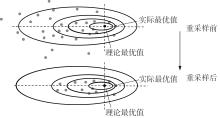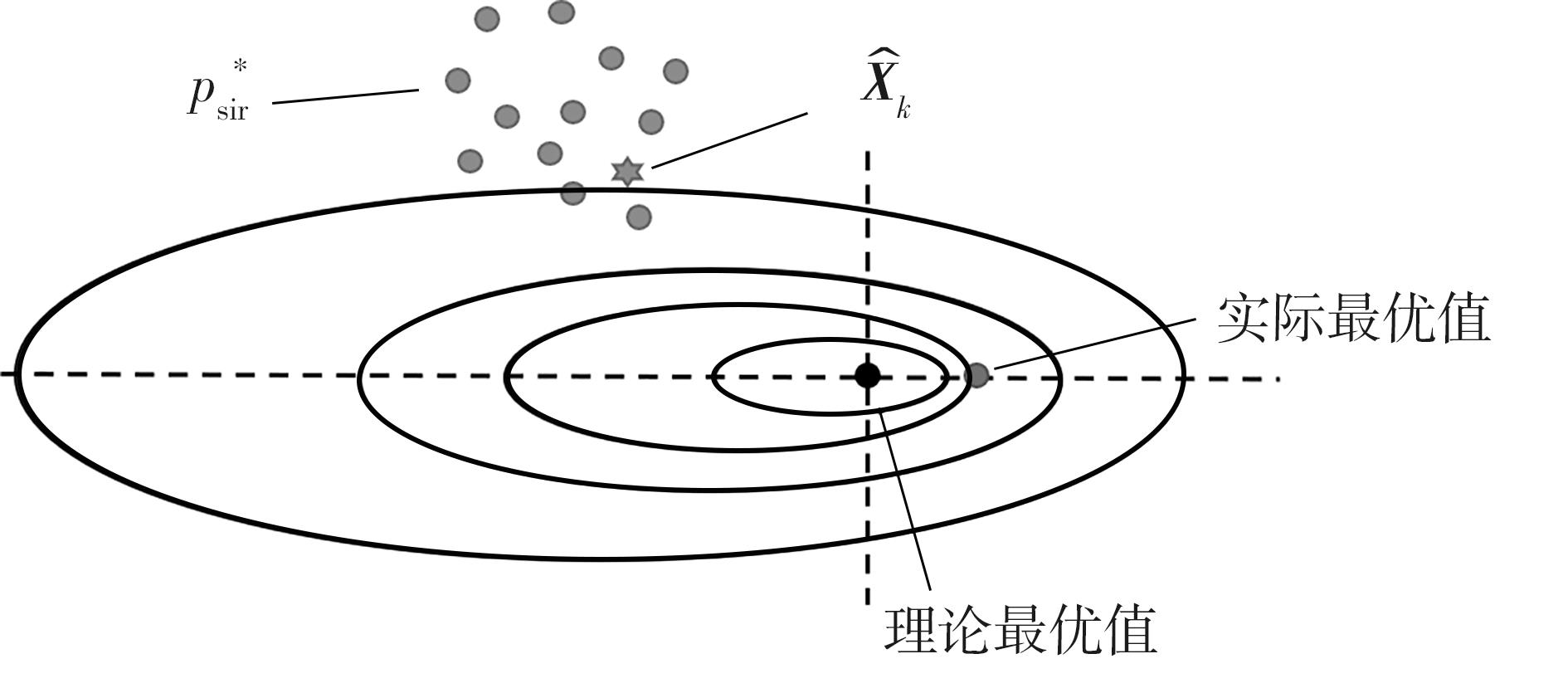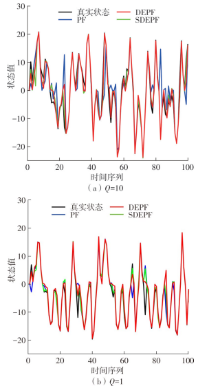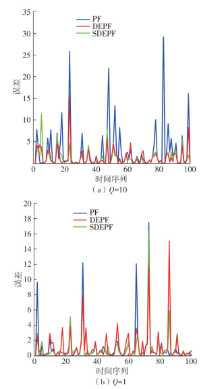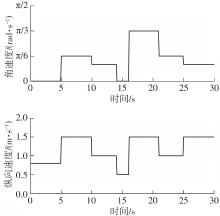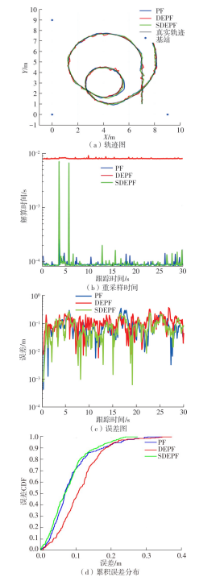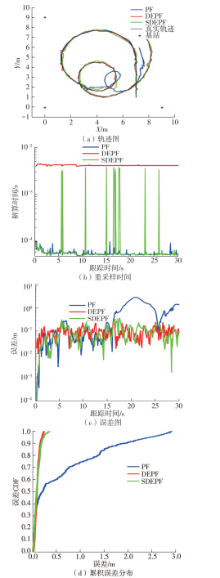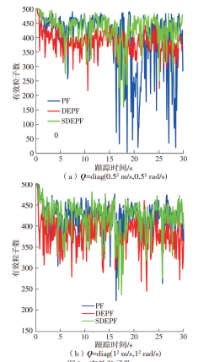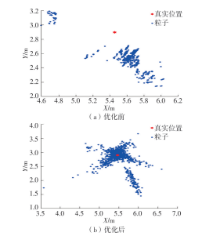| 1 |
NIKNEJAD H T, TAKEUCHI A, MITA S,et al .On-road multivehicle tracking using deformable object model and particle filter with improved likelihood estimation[J].IEEE Transactions on Intelligent Transportation Systems,2012,13(2):748-758.
|
| 2 |
LI H W, WANG J .Particle filter for manoeuvring target tracking via passive radar measurements with glint noise[J].IET Radar,Sonar and Navigation,2012,6(3):180-189.
|
| 3 |
SCHMIDT S F .The Kalman filter its recognition and development for aerospace applications[J].Guide Control,1981,4(1):4-7.
|
| 4 |
JULIER S J, UHLMANN J K .Unscented filtering and nonlinear estimation[J].IEEE Proc,2004,92(3):401-422.
|
| 5 |
ARULAMPALAM M S, MASKELL S, GORDON N,et al .A tutorial on particle filters for online nonlinear/non-Gaussian Bayesian tracking[J].IEEE Transactions on Signal Processing,2002,50(2):174-188.
|
| 6 |
PAK J M, AHN C K, SHI P,et al .Self-recovering extended Kalman filtering algorithm based on model-based diagnosis and resetting using an assisting FIR filter[J].Neurocomputing,2016,173(3):645-658.
|
| 7 |
ZHOU N, MENG D, LU S .Estimation of the dynamic states of synchronous machines using an extended particle filter[J].IEEE Transactions on Power Systems,2013,28(4):4152-4161.
|
| 8 |
DU X, WANG Y, HU H,et al .The attitude inversion method of geostationary satellites based on unscented particle filter[J].Advances in Space Research,2018,61(8):1984-1996.
|
| 9 |
XIA B, SUN Z, ZHANG R,et al .A cubature particle filter algorithm to estimate the state of the charge of lithium-ion batteries based on a second-order equivalent circuit model[J].Energies,2017,10(4):457-459.
|
| 10 |
JING L, VADAKKEPAT P .Interacting MCMC particle filter for tracking maneuvering target[J].Digital Signal Processing,2010,20(2):561-574.
|
| 11 |
田梦楚,薄煜明,陈志敏,等 .萤火虫算法智能优化粒子滤波[J].自动化学报,2016,42(1):90-97.
|
|
TIAN Meng-chu, BO Yu-ming, CHEN Zhi-min,et al .Firefly algorithm intelligence optimized particle filter[J].Acta Automation Sinica,2016,42(1):90-97.
|
| 12 |
ZHANG Z, HUANG C, DING D,et al .Hummingbirds optimization algorithm-based particle filter for maneuvering target tracking[J].Nonlinear Dynamics 2019,97(2):1227-1243.
|
| 13 |
TIAN Y, LU C, WANG Z .Artificial fish swarm algorithm-based particle filter for Li-ion battery life prediction[J].Mathematical Problems in Engineering,2014,2014(1):1-10.
|
| 14 |
ZHOU N, LAU L, BAI R,et al .A genetic optimization resampling based particle filtering algorithm for indoor target tracking[J].Remote Sensing,2021,13(1):132.
|
| 15 |
MOGHADDASI S S, FARAJI N .A hybrid algorithm based on particle filter and genetic algorithm for target tracking[J].Expert Systems with Applications,2020,147:113188-113200.
|
| 16 |
ZHANG Q B, WANG P, CHEN Z H .An improved particle filter for mobile robot localization based on particle swarm optimization[J].Expert Systems with Applications,2019,135(1):181-193.
|
| 17 |
JING Z, LI Z .Particle filter based on particle swarm optimization resampling for vision tracking[J].Expert Systems with Applications,2010,37(12):8910-8914.
|
| 18 |
HAN H, HAO Y S,KUANGRONG .A new immune particle filter algorithm for tracking a moving target[C]∥Proceedings of the Sixth International Conference on Natural Computation.Shanghai:IEEE,2010:3248-3252.
|
| 19 |
KUPTAMETEE C, AUNSRI N .A review of resampling techniques in particle filtering framework[J].Measurement,2022,193(1):110836-110850.
|
| 20 |
LIU J S, CHEN R,LOGVINENKO .A theoretical framework for sequential importance sampling with resampling[M].New York:Springer,2001:225-246.
|
| 21 |
MAESSCHALCK R D, Rimbaud D J, MASSART D L .The Mahalanobis distance[J].Chemometrics and Intelligent Laboratory Systems,2000,50(1):1-18.
|
| 22 |
SMITH R .On the representation of spatial uncertainty[J].The International Journal of Robotics Research,1986,5(4):56-58.
|
| 23 |
HU J H .Multi-search differential evolution algorithm[J].Applied Intelligence the International Journal of Artificial Intelligence Neural Networks & Complex Problem Solving Technologies,2017,47(1):231-256.
|
| 24 |
PRICE K V .Differential evolution[M].Berlin,Heidelberg:Springer,2013:187-214.
|
| 25 |
EIBEN Á E, HINTERDING R, MICHALEWICZ Z .Parameter control in evolutionary algorithms[J].IEEE Transactions on Evolutionary Computation,1999,3(2):124-141.
|
| 26 |
WANG X, CHENG H, HUANG M .QoS multicast routing protocol oriented to cognitive network using competitive coevolutionary algorithm[J].Expert Systems with Applications,2014,41(10):4513-4528.
|
| 27 |
LIU H, CAI Z, WANG Y .Hybridizing particle swarm optimization with differential evolution for constrained numerical and engineering optimization[J].Applied Soft Computing,2010,10(2):629-640.
|
| 28 |
HERMAN B .Close approximations of percentage points of the chi-square distribution and poisson confidence limits[J].Journal of the American Statistical Association,1973,68(343):581-584.
|
| 29 |
HU,Z B, XIONG S W, SU Q H, et al .Finite Markov chain analysis of classical differential evolution algorithm[J].Journal of Computational and Applied Mathematics,2014,10(268):121-134.
|
| 30 |
SOLIS F, WETS R .Minimization by random search techniques[J].Mathematics of Operations Research,1986,6(1):19-30
|
| 31 |
WANG F, HE X S, WANG Y,et al .Markov model and convergence analysis based on cuckoo search algorithm[J].Computer Engineering,2012,38(11):180-182.
|
| 32 |
骆剑平,李霞,陈泯融 .混合蛙跳算法的Markov模型及其收敛性分析[J].电子学报,2010,38(12):2875-2880.
|
|
LUO Jian-ping, LI Xia, CHEN Min-rong .The Markov model of shuffled frog leaping alogrithm and its convergence analysis[J].Acta Electronica Sinica,2010,38(12):2875-2880
|
| 33 |
GORDON N J, SALMOND D J, SMITH A .Novel approach to nonlinear/non-Gaussian Bayesian state estimation[J].IEE Proceedings F-Radar and Signal Processing,2002,140(2):107-113.
|
| 34 |
ZHAI G, MENG H D, WANG X Q,et al .A constant speed changing rate and constant turn rate model for maneuvering target tracking[J].Sensors,2014,14(3):5239-5253.
|
| 35 |
SCHUBERT R, ADAM C, OBST M,et al .Empirical evaluation of vehicular models for ego motion estimation[C]∥Proceedings of the 2011 IEEE Intelligent Vehicles Symposium(IV).Baden-Baden:IEEE,2011:534-539.
|
